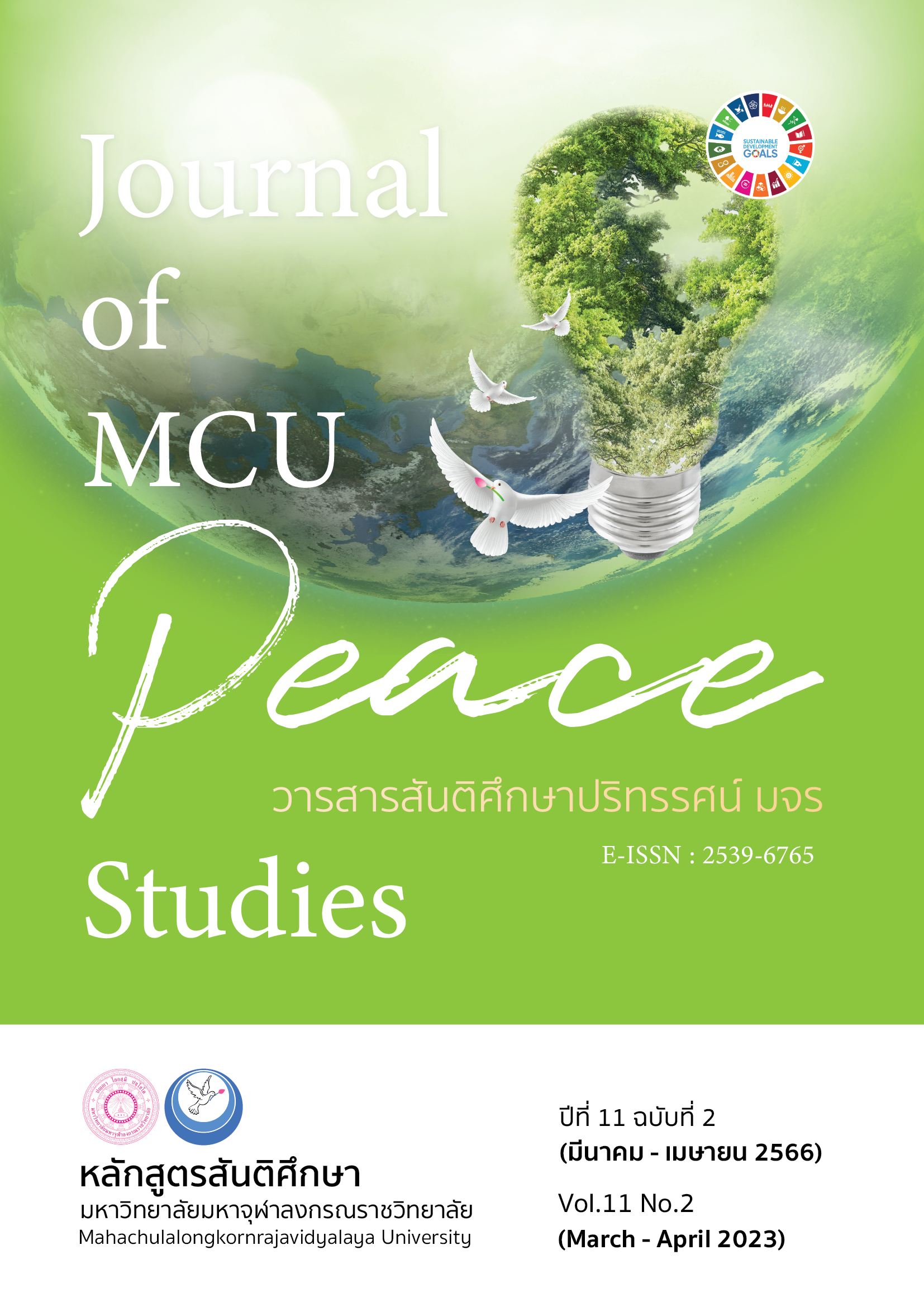แพลตฟอร์มดิจิทัลเพื่อการขับเคลื่อนชุมชนปลอดขยะวิถีพุทธ ภายใต้แนวคิดเศรษฐกิจหมุนเวียน
Main Article Content
บทคัดย่อ
บทความวิจัยนี้มีวัตถุประสงค์ 1) เพื่อพัฒนาฐานข้อมูลในรูปแบบดิจิทัลเพื่อการจัดการสู่ชุมชนปลอดขยะวิถีพุทธภายใต้แนวคิดเศรษฐกิจหมุนเวียน 2) เพื่อพัฒนาแพลตฟอร์มดิจิทัลเพื่อขับเคลื่อนการจัดการชุมชนปลอดขยะวิถีพุทธภายใต้แนวคิดเศรษฐกิจหมุนเวียน 3) เพื่อพัฒนาต้นแบบชุมชนปลอดขยะวิถีพุทธ ภายใต้แนวคิดเศรษฐกิจหมุนเวียน: องค์การบริหารส่วนตำบลบ้านป้อม อ.พระนครศรีอยุธยา จ.พระนครศรีอยุธยา 4) เพื่อสร้างเครือข่ายชุมชนปลอดขยะวิถีพุทธ ภายใต้แนวคิดเศรษฐกิจหมุนเวียน: อำเภอพระนครศรีอยุธยา จังหวัดพระนครศรีอยุธยา เป็นการวิจัยเชิงปฏิบัติการ เริ่มการศึกษาโดยรวบรวมจากชุมชนปลอดขยะต้นแบบ 9 แห่งในประเทศไทย โดยการสัมภาษณ์เชิงลึกผู้ให้ข้อมูลสำคัญจำนวน 27 คน เพื่อนำมาสร้างเป็นชุดความรู้ประกอบการพัฒนาแพลตดิจิทัลและการสร้างชุมชนต้นแบบ อีกทั้งยังได้เปิดรับอาสาสมัครซึ่งเป็นตัวแทนครัวเรือนที่สนใจและลงทะเบียนเข้าร่วมกิจกรรมการใช้แพลตฟอร์มดิจิทัลและการจัดการขยะตามหลัก 3Rs จำนวน 108 ครัวเรือน เก็บข้อมูลเชิงปริมาณ โดยใช้แบบสอบถามและเก็บข้อมูลเชิงคุณภาพจากอาสาสมัครเข้าร่วมสนทนากลุ่มเจาะจง จำนวน 15 คน อีกทั้งมีการเก็บข้อมูลจากเครือข่ายชุมชนที่เข้ามาแลกเปลี่ยนเรียนรู้และสนับสนุนกิจกรรม จำนวน 9 รูป/คน วิเคราะห์ข้อมูลเชิงคุณภาพโดยการวิเคราะห์เนื้อหา วิเคราะห์ข้อมูลเชิงปริมาณโดยใช้สถิติเชิงพรรณนาหาค่าเฉลี่ยและส่วนเบี่ยงเบนมาตรฐาน
ผลการวิจัยพบว่า 1) การพัฒนาฐานข้อมูลในรูปแบบดิจิทัลเพื่อการจัดการสู่ชุมชนปลอดขยะวิถีพุทธภายใต้แนวคิดเศรษฐกิจหมุนเวียน พบว่า ฐานข้อมูลดิจิทัลด้านการจัดการขยะ มี 3 ฐาน คือ (1) ฐานข้อมูลดิจิทัลด้านการจัดการขยะชุมชนต้นแบบ 9 ชุมชน (2) ฐานข้อมูลดิจิทัลด้านองค์ความรู้เกี่ยวกับการจัดการขยะ (3) ฐานข้อมูลดิจิทัลด้านรูปแบบชุมชนปลอดขยะวิถีพุทธ โดยเผยแพร่บนเว็บไซต์ https://www.bcgbymcu.com 2) การพัฒนาแพลตฟอร์มดิจิทัลเพื่อขับเคลื่อนการจัดการชุมชนปลอดขยะวิถีพุทธภายใต้แนวคิดเศรษฐกิจหมุนเวียน พบว่า แพลตฟอร์มดิจิทัล Line BCG มีการใช้งานฟังก์ชันความรู้การจัดการขยะตามหลัก 3Rs ฟังก์ชันบันทึกปริมาณขยะและฟังก์ชันรายงานปริมาณขยะครัวเรือนและชุมชน 3) การพัฒนาต้นแบบชุมชนปลอดขยะวิถีพุทธ ภายใต้แนวคิดเศรษฐกิจหมุนเวียน พบว่า การพัฒนาต้นแบบชุมชนปลอดขยะ ประกอบด้วย ฐาน 1 เปิดใจ ฐาน 2 เข้าร่วมและเข้าใจ (ศีล) ฐาน 3 มุ่งมั่นและตั้งใจ (สมาธิ) มี 5 กิจกรรม และฐาน 4 เพื่อนแนะนำเพื่อน (ปัญญา) ผลการประเมิน พบว่า 2 ชุมชนและ 108 ครัวเรือน คัดแยกขยะถูกต้อง บันทึกปริมาณขยะ มีรายได้จากการขายขยะ ทำความสะอาดหน้าบ้านและชุมชน 4) การสร้างเครือข่ายชุมชนปลอดขยะวิถีพุทธภายใต้แนวคิดเศรษฐกิจหมุนเวียน พบว่า มีเครือข่าย 2 กลุ่ม คือ (1) เครือข่ายสนับสนุนส่งเสริม ได้แก่ วัด โรงเรียน และสมาคมอยุธยารวมใจหน่วยกู้ภัยอยุธยา (2) เครือข่ายแลกเปลี่ยนเรียนรู้ ได้แก่ ชุมชนตำบลบ้านป้อม ชุมชนตำบลภูเขาทอง และชุมชนตำบลสำเภาล่ม
Article Details

อนุญาตภายใต้เงื่อนไข Creative Commons Attribution-NonCommercial-NoDerivatives 4.0 International License.
ทัศนะและความคิดเห็นที่ปรากฏในบทความในวารสาร ถือเป็นความรับผิดชอบของผู้เขียนบทความนั้น และไม่ถือเป็นทัศนะและความรับผิดชอบของกองบรรณาธิการ ยินยอมว่าบทความเป็นลิขสิทธิ์ของวารสาร
เอกสารอ้างอิง
Ban Makhamtat Residents. (2022). Mu 2. Ban Pom Sub-district. Phra Nakhon Si Ayutthaya District. Phra Nakhon Si Ayutthaya Province. Community Waste Management. Interview. March, 26.
Dailiynews. (2022). Ayutthaya’s Waste Management Movement. Retrieved August 6, 2022, from https://d.dailynew.co.th/article
Duangkaew, C. et al. (2021). Perception and Guidelines to Drive the Circul Economy Concept for Plastic Waste Management the 3Rs Principle in the Nonthauri City Municipality. Journal of MCU Nakhondhat, 8(9), 252-253.
Green Network. (2019). No Place for Waste. GREEN Article. Retrieved October 19, 2021, from https://www.greennetworkthailand.com
Jeamponk, P. (2012). The Study of Solid Waste Utility and Household Management at Suanluang Sub-District, Amphawa Disstrict, Samutsongkram Province. (Research Report). Bangkok: Suan Sunandha Rajabhat University.
Jurapongvanich, P. (2021). Research and Development Five Silver Jewelry Platform for Digital Society, The 3rd National Conference 2021 “Business Transformatio: Social Challenges”.
Juthatip, C. (2022). Digital Knowledge Base about Ethnic Groups in Thailand. Journal of Information Science, 39(4), 46-58.
Kao-Un, S. et al. (2021). Participatory Action Research on Community-Base Waste Management: Lamphayont Subdistrict Administrative Organization Tak Fa District Nakhonsawan Province. Western University Research Journal of Humanities and Social Science, 7(2), 185-186.
Natural Resources and Environmental Policy and Planning. (2022). June 4th, 2022, Thailand Was the World’s Third Largest Contributor of Waste. Retrieved August 5, 2022, from https://www.onep.go.th/4-, https://www.naewna.com/likesara/658088
Phramaha Suthit Aphakaro (Oboun). (2004). Network: Nature, Knowledge and Management. Bangkok: Learning Strengthening Project for Happy Community.
Pollution Control Department. (2022). 2022 Government’s Strict Measures: Total Ban on Plastic Bags, Disposable thin Plastic Cups and Foam Packaging Boxes, Encouraging Private Sector Participation. Information Technology System Development and Management Department. Retrieved August 6, 2022, from https://www.pcd.go.th/pcd_news/
Promsit, S. (2019). The Large, Middle and Small sizes of Municipality Waste Management of Local Government Organization in Northeast Region of Thailand. NEU Academic and Research Journal, 9(1), 67.
Punchanit, P. et al. (2021). The Development of Digital Platform of an External Educational Quality Assurance Systems for Higher Education in Thailand. Journal of Science Ladkrabang, 30(2), 25.
Rapeepat, W. et al. (2020). Solid Waste Management of Sawasdee Village at Kalantha Sub - District, Muang District Buriram Province. Journal of MBU LNC., 27(1), 59.
Thuong, C. (2019). Solutions to Garbage Mountains Offered by Ban Pom Community Organization Council. Retrieved August 5, 2022, from https://web.codi.or.th/20190628-6053/
Tipjak, S. et al. (2018). Development of Digital Archives Database of University of Phayao. PULINET Journal, 3(5), 25.
Yonsunthia, W. (2014). The Proper Waste Disposal Format and Method of Nong Bunnak Subdistric Administrative Organization, Nong Bunmak District, Nakhonratchasima Provice, Suranaree University of Technology. (Master’s Thesis). Suranaree University of Technology. Nakhonratchasima.


